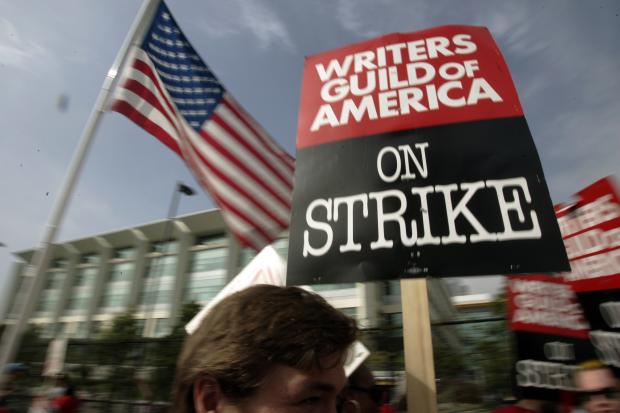
In this photo, taken Nov. 9, 2007, Writers Guild of America (WGA) writers and others strike against the Alliance of Motion Picture and Television Producers (AMPTP) in a rally at Fox Plaza in Los Angeles’ Century City district. Hollywood is facing a cliffhanger after members of the Writers Guild of America voted overwhelmingly to authorize a strike that could begin as soon as May 2, the day after the current contract ends. The previous writers’ strike lasted 100 days in 2007-08 and was costly to the businesses that serve Hollywood and to consumers expecting to be entertained. (Photo by REED SAXON / AP)
LOS ANGELES — A tentative deal was reached between screenwriters and producers Tuesday, averting a strike that could have crippled TV and film production and inflicted harm on the wider California economy.
The three-year agreement, which requires ratification by members of the Writers Guild of America, was confirmed by the guild and producers’ spokesman Jarryd Gonzales shortly after the current contract expired early Tuesday. Further details weren’t immediately available.
The two sides held to a media blackout during negotiations that began March 13 and centered on compensation and health care.
The agreement spares the late-night shows that would immediately have gone dark without writers, and allows the networks to pursue their schedules for the upcoming TV season without interruption. Movie production would have felt a strike’s sting more gradually.
Guild members voted overwhelmingly last month to authorize a strike, and the WGA could have called for an immediate walkout Tuesday absent a deal. The previous writers’ strike extracted an estimated $2 billion toll on the state.
After the 2007-08 strike, the two sides reached agreements in 2010 and 2013, but TV writers in particular have seen their earnings slide since then and want to claw back some of those losses.
Driving the dispute were changes in how television is distributed, with streaming platforms including Netflix and Amazon joining broadcast and cable TV and rising in importance.
More outlets have led to more shows, but the TV season model is greatly changed. Despite the fact that there are more series than ever – 455 this season, more than double the number six years ago – shows run for fewer episodes than the traditional 22-24 episode broadcast series.
Short seasons of eight, 10 or 12 episodes means less pay for writers whose payment is structured on a per-episode basis.
The 2007-08 strike played out in true Hollywood style. Writers took to social media to make their case, entertainingly. Stars including Julia Louis-Dreyfus and Tina Fey joined picket lines, and then-“Tonight Show“ host Jay Leno brought doughnuts for strikers.
Before Tuesday’s deal was announced, writer-actress Lena Dunham said she would back a strike this time.
“I would never have had the health coverage I had without the union, and that’s one of the main points in this,“ Dunham said at the Met Gala on Monday night.
Actress Debra Winger said she would support any reasonable job action by the writers, but was mindful of the damage it would cause.
“I’m thinking of all the businesses that I work with at Warner Bros. for several months out of the year and (the) restaurants, shoe repair, dry cleaners,“ Winger said during an interview promoting her new film, “The Lovers.“ “The last writers’ strike affected the city of Los Angeles in a devastating way.”
At the Met Gala, CBS chairman and CEO Les Moonves said he was guardedly optimistic that a deal would be reached without a strike.
* * *
Associated Press writers Marcela Isaza in Los Angeles and Brooke Lefferts in New York contributed to this report.